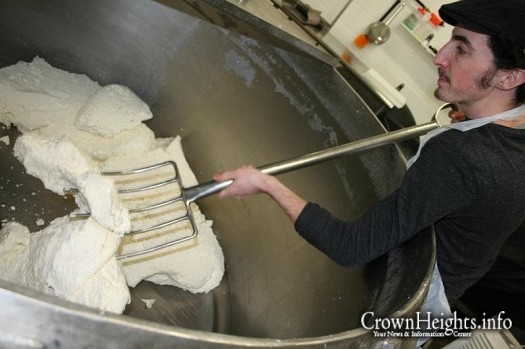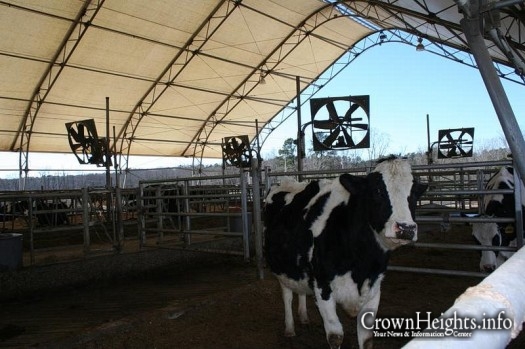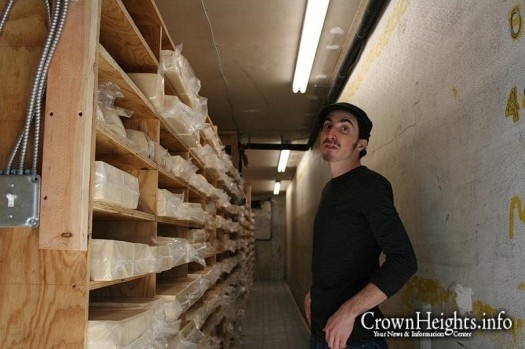
Cultured Cow Creamery Producing Kosher Cheese
Rabbi Sholom Estrin starts work at the Cultured Cow Creamery in Durham at 4:30 a.m., and he works until mid-afternoon four days each week to make cheddar cheese according to Jewish dietary laws.
The creamery is located on the grounds of a dairy farm on Kemp Road. By late morning on Tuesday, milk had already been pumped from cows in a neighboring milking parlor into a cheese vat, and Estrin was leaning inside to flip slabs of cheese curd in order to separate out the liquid whey.
Estrin, who is one of three rabbis at a synagogue in Raleigh, said kosher means “fit.” Kosher foods are prepared to certain standards as dictated by Jewish dietary laws. He said kosher cheeses have wide appeal because of their high preparation standards.
The creamery started cheese production in September, Estrin said. So far, they’ve been producing about 1,000 pounds of cheese per week. The cheese they’ve made so far is in various stages of the aging process.
They’ve been working to sell their finished cheeses to kosher food stores in the Northeast as well as locally to stores and restaurants, Estrin said. Their cheese is at Weaver Street Market and at other area stores and restaurants, according to the company’s website.
Estrin became cheesemaker option No. 2 in the effort when the original cheesemaker backed out of the project.
He said he learned about cheesemaking from books, the Internet and from a consultant brought in to help launch the business. Estrin said he started experimenting with making cheese in April, and was producing cheese by September.
“It’s so amazing,” Estrin said of the process. “There’s a certain element for a person who really works with their hands, does something that takes effort; (you) appreciate life in a bigger way,” he added.
The dairy farm where the creamery is located is owned by David Falk, who has worked in the real estate. Estrin said he knows Falk, and was inspired by what he said was his entrepreneurial vision.
Falk is a partner in a business called Agri-Science Opportunities, which includes the creamery as well as other businesss divisions. Sam Galphin, a veterinarian who said he’s worked with cattle his whole career, is also a partner.
Galphin said Agri-Science Opportunities incorporates not only cheesemaking, but also milk production. The farm, which is 135 acres, he said, is limited to 100 cows in milk at one time. They’ve been producing milk since January from a herd of Holstein cattle, Galphin said.
They added cheese to their business line-up in order to add what he called a value-added product to help support the business. Galphin said cattle feed prices have increased as a result of last year’s drought, and also as a result of a federal mandate for blending gasoline with ethanol. He said the requirement takes some of the grain supply out of the market, which drives up the price of the remaining grain that’s used for feed.
“The long, story short is I knew that you could not survive in the dairy industry selling food milk with feed prices as high as they are right now,” Galphin said. “Since you can’t do that, I went into this business with the idea of having a value-added product. The cheese is our value-added product.”
In addition to those business divisions, Galphin said they also plan to use the dairy farm as a place that can facilitate research as well as green energy innovation projects. The farm is equipped with wind turbines, solar panels, as well as other energy conservation systems.
Galphin said he’s an adjunct professor at N.C. State University College of Veterinary Medicine, and he said he sees the farm and the business as a means of educating students.
In addition, Galphin is an embryo transfer specialist, and does embryo transfer and in vitro fertilization to produce cows that have traits seen as beneficial by dairy farmers.
He said he sees business and all its divisions as a means to help food production keep pace with the global human population growth, especially in the developing world.
“We have a vision we hope will contribute to help solve this problem,” he said.
















proud
what a mentch!! keep it up!
Ask Rabbi Estrin...
If he knows what Tefilahs cows daven?
MOOoooooo Sof !!!!!!!!
We love you Sholom!!!!
Where’s MY cheese???!!!!
Your Friends from Cleveland!!!
Ber
Your the best, keep up your good work.
Eli
Shalom Ber, way to go! I wish I could live and work on the farm instead of my NYC office!
Regards from the days at Camp Lman Achai!
declasse' intellectual
The secret to great chedder is the cow itself. The amount of butterfat that is in its milk and that is influenced totoly by what it eats. In Vermont, the milk used in Cabot chedder cheese{Kosher–stam} and as well Cabot O/U kosher for Pesach cheese is rich in
butterfat content. The best chedeer is aged from two to five years. Note:::: There is no such thing as aged low fat or reduced chedder or any kind of cheese because what ages is the butterfat(put it simply) and when that is removed there can be no aging of the cheese. What makes the difference in mild to sharp to extra sharp is how long is it aged.
Be interesting if this cheese makes it to other parts of the world.